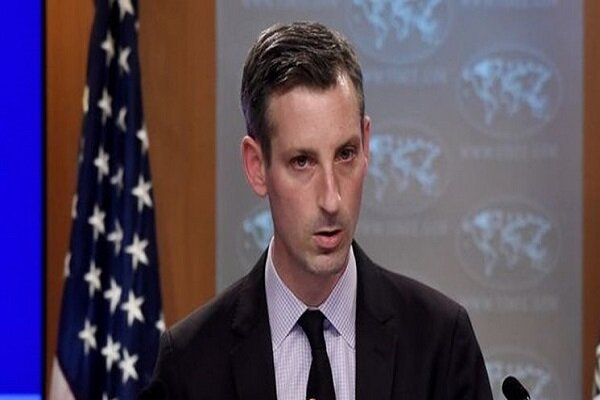Tuesday 26 July 2022 - 18:06
Story Code : 398658
Price says US equally preparing for two scenarios on JCPOA
Referring to the phone call between the French and Iranian presidents and the talks between the US and Iran, Ned Price in his weekly press conference on Monday claimed, "It�s difficult for me to say because the fact is that it is � the onus is on Iran to come forward to make clear that Tehran is ready to engage constructively, to put aside extraneous issues, and to talk in good faith about the deal that has been on the table for some time... We are prepared to re-enter on a mutual basis the JCPOA. But of course, mutual means it�s a two-way street; the Iranians would need to do the same. We have not yet, at least to date, seen the Iranians indicate that they�re ready to do that."
It came as the Iranian Foreign Minister Hossein Amir Abdollahian in a phone conversation with the EU High Representative for Foreign Affairs and Security Policy Josep Borrell last Monday said that there is no doubt about Iran�s determination to reach a lasting agreement, adding that the US must set aside its extravagant demands and instead take realistic steps toward reaching an agreement.
Elsewhere in his remarks, Ned price in response to a question about the latest remarks of the head of Iran�s Atomic Energy Agency on�JCPOA-related IAEA cameras claimed, "We talked about this in recent weeks, and we noted last month that Iran�s decision to turn off multiple JCPOA-related IAEA cameras responding to the very clear call that Iran heard from the international community for more transparency by offering only less transparency was extremely regrettable, to put it mildly. It was the latest in a series of such steps. We know, and the fact is that maintaining reduced JCPOA-related transparency with the IAEA only complicates the challenges associated with a potential mutual return to compliance with the JCPOA. It only deepens the nuclear crisis that Iran itself has created."
"When it comes to potential implications, as part of any negotiated mutual return to compliance with the JCPOA, Iran will have to provide whatever information and transparency the IAEA deems necessary to allow it to verify Iran�s JCPOA declarations," he added. "As we�ve said, we�ll continuously reassess the nonproliferation benefits of the JCPOA. As I mentioned just a moment ago, we will continue to pursue a mutual return to compliance with the JCPOA for as long as that assessment is � makes clear that a mutual return to compliance would be in our national security interest � that is to say, that a mutual return to compliance would put us in a stronger position vis-�-vis Iran�s nuclear program than we�re in today."
The head of the Atomic Energy Organization of Iran (AEOI) Mohammad Eslami said on Monday that the beyond Safeguards Agreement cameras will not be turned on until returning of the other side to the nuclear deal.
Eslami noted that when Westerners return to the agreement and Iran is assured that they are not doing any acts of mischief, AEOI will make a decision on those cameras.
He also added that the Islamic Republic of Iran has nothing to hide in its nuclear activities and nothing has been done in the uranium enrichment field without the agency's coordination.
"All Iran's atomic infrastructures have been operating based on the cooperation with the agency and under the supervision of this organization. The IAEA is currently present in all of Iran's nuclear centers in accordance with the Safeguards Agreement," Eslami continued.
Ned Price also said the ball is now with Iran, claiming that it has been several weeks that they haven�t heard back from Iran a positive step toward a deal.
"We will pursue a mutual return to compliance with the JCPOA for as long as it�s in our national security interest. That is not something that we can attach a calendar date to precisely because we are always � and when I say we, I mean the collective we, the United States Government � is always taking a close look at the underlying factors. In this case, it�s primarily the advancements that Iran is making with its nuclear program. One thing is very certain: we will reach a point where the deal that�s been on the tables for several months now will not be in our interest. And we�ll reach that point as soon as the advancements that Iran has made and is making overtake the nonproliferation benefits that the JCPOA would convey."
"... And that�s why for some time we have been preparing equally for scenarios in which there is a mutual return to compliance with the JCPOA, and a scenario in which there is not a mutual return to compliance with the JCPOA," ha said.
His remarks came as Iran and the five remaining parties to the JCPOA had held several rounds of negotiations in the Austrian capital of Vienna since April last year to restore the agreement, which was abandoned by former US President Donald Trump in May 2018.
In quitting the agreement, Trump restored sanctions on Iran as part of what he called the �maximum pressure� campaign against the country. Those sanctions are being enforced to this day by the Joe Biden administration, even though it has repeatedly acknowledged that the policy has been a mistake and a failure.
Meanwhile, Iran and the US concluded two days of indirect talks, mediated by the European Union, in the Qatari capital of Doha, late in July in an attempt to break the stalemate in reviving the JCPOA.
By MEHR�
# Tags











